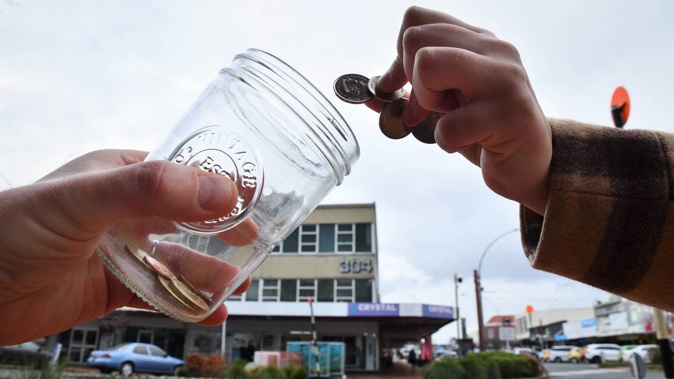
A prominent Rotorua businessman is calling for a ban on begging in the city after customers were “pestered” and staff had to be given panic buttons as beggar numbers rose.
It comes as authorities consider developing a bylaw to tackle the “emerging issue” in response to public concern, including that elderly people are being intimidated.
A Rotorua Lakes Council bylaw would be considered as part of the Community Safety Plan it was developing with police to reduce crime and violent offending in the city.
McDonald’s Rotorua franchise owner Rob Parry said he agreed with the idea of a bylaw.
He said he had raised the issue of beggars at the Fenton St site a number of times and supported anything the council could do to help.
Last year he hired full-time security to protect staff and patrons at the Fenton St restaurant after abusive behaviour from beggars and people he believed were homeless.
Parry said he wanted to make customers’ experience as enjoyable as possible, “without getting pestered” by beggars asking people in the drive-through for money.
He said this week that after he brought in the security, the beggars moved off his property to the street, but they became more prevalent than before.
In February, a perfect storm of food price rises, minimum wage increases and power bills made having security full-time financially unsustainable for the business so he changed to having guards in the evenings only.
“Sadly [full-time security] was one of the things we could not afford.”
He said he had seen an increase in beggars during the day since then.
There were between six and eight near the restaurant a day, but only one at a time: “Otherwise they fight.”
Staff had been given panic alarms, which when pressed alerted Watchdog Security and security was dispatched. Parry said the alarms were used once or twice a week.
/cloudfront-ap-southeast-2.images.arcpublishing.com/nzme/DGAGJALKJRBPROXZDI2DWQO2F4.jpg)
McDonald's Rotorua franchise owner Rob Parry. Photo / Kelly Makiha
Rotorua Business Chamber chief executive Bryce Heard said the first time a member had advised him of an issue with antisocial behaviour from beggars was last Tuesday morning, the day Local Democracy Reporting contacted him.
The council advised him it was looking at a potential bylaw the same week.
Council community wellbeing deputy chief executive Anaru Pewhairangi spoke to councillors at a meeting on Wednesday last week.
The only mention of it in the agenda was that a current state analysis was needed and early discussions about potential bylaw development had been held. It called it an “emerging issue”.
Pehwairangi told councillors a couple of members of the community had raised concerns.
“We have met with those groups and we have a plan in place in regards to better understanding that situation.”
This included looking at bylaws for infringement enforcement.
Rotorua Lakes Council community wellbeing deputy chief executive Anaru Pewhairangi. Photo / Laura Smith
Acting mayor Sandra Kai Fong said community safety was a council priority and asked about the development of “environmental scans” which would inform the draft Community Safety Strategy.
The scans would gather information to determine areas where intervention was needed, and Pewhairangi said it included how impactful begging was.
He said dealing with begging was challenging in the sense that those doing it knew their rights.
“Generally they are standing in a public place.”
Whether it was a bylaw or something else, he said there were challenges to what it and police could do.
In response to councillor Conan O’Brien asking what happened when community safety team members came across antisocial behaviour, Pewhairangi said police were called if the behaviour escalated to being unsafe.
After the meeting, O’Brien said three or four members of the public had contacted him with concerns.
Some of these related to intimidation from beggars, including to elderly people, while others were about the safety of beggars in areas such as roadsides.
Local Democracy Reporting asked the council questions ahead of the meeting, and the response was that it would not pre-empt any discussion.
Questions included what prompted the topic, who was involved in discussions, how complaints related to begging had been trending, what a bylaw might look like, what development of a bylaw might cost and whether there had been any investigation or similar bylaw in Rotorua before.
The questions were asked again following the meeting but the council said it had nothing to add to what was said in the meeting.
Rotorua area commander inspector Herby Ngawhika said local legislation, or potential local legislation, was not for the police to comment on.
“Begging in itself is not a criminal offence so we are unable to provide any comment on reports of this to police – incidents would be coded in a number of ways in police systems.”
He said it worked with community partners so people were safe and anyone who had immediate concerns for safety should call 111.
Case study: Tauranga’s short-lived begging ban
Tauranga City Council controversially banned begging and rough sleeping within 5m of public entrances to retail or hospitality premises in the Tauranga City, Greerton and Mount Maunganui CBDs in 2019.
The Bay of Plenty Times reported views at the time were mixed; retailers said beggars and rough sleepers were causing them significant issues, but others worried about the city’s vulnerable.
The bans were revoked a year later.
The Tauranga Housing Action Trust had applied for a judicial review of the council’s decision to introduce the bylaw, likely to cost the council more than $100,000, but when the decision to revoke the bylaw was made trust spokesman Shard Loibl said there would be no need for the review if the council followed through.
Laura Smith is a Local Democracy Reporting journalist based at the Rotorua Daily Post. She previously reported general news for the Otago Daily Times and Southland Express, and has been a journalist for four years.
- Public Interest Journalism funded through NZ on Air
Take your Radio, Podcasts and Music with you

/cloudfront-ap-southeast-2.images.arcpublishing.com/nzme/JTQ7PSCE3VBFJBR7BO3OBAMNUA.JPG)








